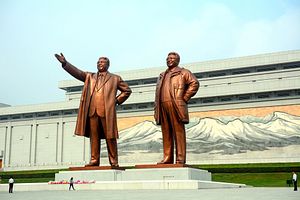Reports of bloody purges in North Korea are nothing new. But even by the standards normally associated with the totalitarian country, current leader Kim Jong-un has garnered a reputation as an especially bloodthirsty despot. Earlier this year, South Korea’s National Intelligence Service claimed that the dictator had overseen the executions of some 70 officials since taking power.
There was little surprise, then, in this week’s reports of the latest bloody purge inside the country. For having the temerity to disagree with Kim’s forestation policy, Vice Premier Choe Yong-gon was shot to death, according to South Korea’s Yonhap News Agency.
The news contained all the familiar elements of previous purges: a high-powered official who had the ear of the leader; the official’s intolerable intransigence; the official’s swift and brutal demise.
There was also another, largely overlooked similarity: the news was based entirely on a single anonymous source. What’s more, the source’s credibility was not even bolstered with any identifying context. The original Yonhap report, which was picked up hungrily by local and international media, merely described the origin of the explosive claim as a “source who demanded anonymity.”
Not for flimsy sourcing alone does the news deserve healthy skepticism. Media have recounted unfounded North Korea-related rumors before. In 2013, Hyon Song-wol, a singer believed to be a former squeeze of Kim Jong-un, was reported to have been executed for appearing in a sex tape, only to appear on state television the following year, very much alive. Then, as now, initial reports and analyses were confident and assured in tone.
“In an overall environment of poor inter-Korean relations, it may be that South Korea has little to lose from openly speculating about another relatively high-level purge,” Adam Cathcart, a North Korea watcher at the University of Leeds, told The Diplomat. “It’s not as if there is an upcoming summit or set of talks that needs to be delicately offset by toning down criticism of the North, and the recent mine incident on the DMZ, and the return of the loudspeakers on the southern side very much emphasize that.”
Yet the purge and execution of an official like Choe doesn’t strain credulity, either, even if it deserves to be filed under “unconfirmed” for now. In 2013, Jang Song-thaek, a close confidant of Kim and his uncle by marriage, was executed for allegedly plotting against the party and state. In an unusual move, North Korea’s state media confirmed the execution.
“I suppose we will have to wait for the purgee to show up, or wait for the next round of yet more improbable rumors of how he has ostensibly been executed,” said Cathcart.
There is little cause to assume the regime will provide confirmation, one way or the other. Jang’s publicized demise was an exception to the rule.
“Part of the problem with the rumor mill is how high the bar has been set with the Jang Song-thaek execution: The state only very rarely provides its foreign news/propaganda operations with something tangible (let alone thundering) about purges,” said Carthcart, “and we are unlikely to see any repeat of the rather elaborate events that accompanied Jang’s execution — a sprawling bombshell of an indictment, loyalty meetings at every work unit (some of which were covered by state media), and even new loyalty songs praising the steadfastness of the fatherly leader, etc.”

































